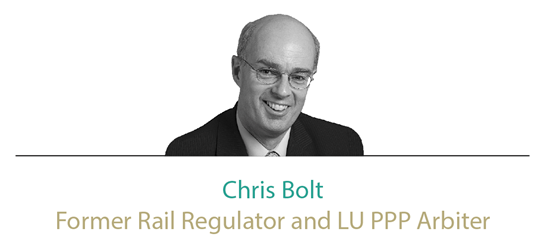
Regulation of the rail sector has always been complex, and arguably was made more so following the abolition of the Strategic Rail Authority.
The original rationale for two economic regulators in rail was to recognise that decisions on services to be provided by franchised passenger operators would affect subsidy. So matters such as minimum service requirements and fares policy were (from the start) the responsibility of the Office of Passenger Rail Franchising, although other consumer protection functions applying to all operators, such as timetable information and complaints handling, were given to ORR (which originally sponsored the passenger watchdog bodies). These functions were transferred to the SRA when that body was established. But when it was abolished, they were taken over by the Department - rather than being returned to ORR.
This has created a confusion about the role of the Department, which has only been made worse by the reclassification of Network Rail. It now exercises policy and strategy functions for the sector, acts as the procurer of passenger rail services, operates as an economic regulator in respect of fares and passenger service standards, and is responsible for shareholder functions in respect of Network Rail. This mix of functions is impossible to exercise effectively and without contradiction. The contradictions would be reduced if some of these functions were transferred to an independent regulator.
What of the argument that Government would lose control if ORR had more power? This argument misunderstands both the role of a regulator and the meaning of independence.
Ministers are rightly concerned to ensure that their legitimate policy and strategic objectives are achieved, efficiently and effectively. But that is precisely what regulators have been set up to do: to provide expert, transparent assurance - whether to consumers or citizens - that service providers are delivering the right outcomes and doing so efficiently. How those outcomes are achieved is part of the assurance process, to ensure that costs are not simply being deferred, or future service levels compromised. If that assurance can be given, that should be enough.
But what of the concern that an independent regulator might take a different view of the required outcomes? As John Swift, the first Rail Regulator, has put it in evidence to the House of Lords: “Independence of the regulator survives so long as, and only so long as, the actions of the regulator do not produce results which are at odds with what a democratic system expects.” In the specific case of rail, it manifestly ignores the HLOS and SoFA process enshrined in the Railways Act 2005.
Although the BIS principles of economic regulation only date from 2011, they are very similar to the principles developed by Ed Balls in respect of the Government’s role in macro-economic policy in 1997 (constrained discretion; credibility through sound, long-term policies; credibility through maximum transparency; credibility through pre-commitment). But the current Government has largely ignored these principles. This is not in the interests of consumers or taxpayers - and ultimately is not in the interests of government either.











